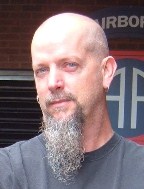- About Archives
- About SAA
- Careers
- Education
- Publications
- Advocacy
- Membership
 Professional Experience: Archivist, Multnomah County (Oregon) Records Program, 1998–present. Multnomah County Privacy Officer since 2003. Records Manager, Pacificorp, 1996–1997. Archivist, Oregon State Archives Division, 1986–1995.
Professional Experience: Archivist, Multnomah County (Oregon) Records Program, 1998–present. Multnomah County Privacy Officer since 2003. Records Manager, Pacificorp, 1996–1997. Archivist, Oregon State Archives Division, 1986–1995.
Education: BS, History, Western Oregon University, Monmouth, Oregon, 1986. Institute for Advanced Archival Administration, University of Pittsburgh, 1991–1995. Archives Leadership Institute, 2010.
Professional Activities: Society of American Archivists: Member since 2000. Government Records Section Steering Committee, 2003–2005. Issues and Advocacy Roundtable, Co-chair, 2005–2007. Program Committee, 2005–2006. Diversity Committee since 2006, Chair since 2007. Membership Committee, 2008–present. Nominating Committee, 2009. RAO Section Steering Committee, 2010–present. Northwest Archivists (NWA): Member since 2002. State Representative to the Board (Oregon), 2004–006. Vice President, 2006–2007. Publications Committee, Chair, 2010–present. Academy of Certified Archivists: Certified in 2004. Other Activities: ARMA Email Guideline Development Task Force, 1994–1996. Archivist (volunteer), Monmouth Public Library, 1997–2005. Library Board (Monmouth, Oregon) member, 2001–2005, Chair 2004–2005. Oregon Archives Month Planning Committee, 2004–present. Tribal Archives, Libraries, and Museums National Conference Planning Committee, 2008–2009.
Question posed by the Nominating Committee: SAA has developed three strategic initiatives: technology, diversity, and public awareness/advocacy. If elected to Council, how will you work with SAA groups and members to move these forward?
It is a challenging time to be an archivist. With increased visibility and power have come increased expectations and accountability for us, individually and together. But this also makes it an exciting time to be archivists. We have the opportunity to make changes—in the profession and in the wider world. Who can ask for more than that chance?
SAA’s strategic initiatives—technology, diversity, and advocacy—are important tools for making that change.
While all of the desired outcomes related to technology are important, I’m especially interested in working on the third initiative, especially as it relates to collaboration. SAA should value every member’s contributions. Technology can expand member opportunities—from online training to virtual conferences to remote workgroups—to participate in the work and governance of the Society. These are high “bang for buck” technologies. They allow greater member participation and can also be used to work with other groups, like regional archival associations or related professional groups. SAA is already implementing some of these technologies, but could do even more and sooner.
Diversity has been a priority of SAA for some time, and rightfully so. The current work on expanding the Mosaic Scholarship, the enlargement of SAA’s Diversity Committee to include members of underrepresented groups, and the creation of a statement on diversity are all evidence of a plan to diversify the profession, SAA, and the historical record. We can do so much more. At its core, diversity is about removing barriers to participation so that all feel welcome and valued. The SAA membership needs to be involved in this process. While decisions have not been made in a vacuum, I don’t believe SAA knows what its members want or need regarding diversity actions. We should ask.
SAA has five desired outcomes related to public awareness/advocacy. All of them support the general goal of increasing public understanding of archives and archivists and their importance to society. While all are necessary, they are missing a key outcome: professional solidarity. There are more than 50 North American archival organizations. Not only do they have great ideas (shout out to the Portland Archives Crawl!) that SAA can use, but a coordinated professional voice carries more authority. SAA needs to set up formal joint advocacy and public awareness programs to share resources and to speak together.
When it comes down to it, leadership is more about *us* than about *me*. None of us get things done by ourselves. I’m looking forward to the opportunity to work with as many colleagues as possible in making our profession, society, and world a better place for all.